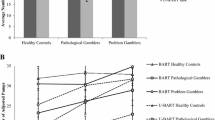Abstract
An experiment in gambling behavior was conducted under the most realistic conditions possible in our laboratory. Not only was there a significant monetary prize offered
but subjects believed that they could be eliminated by a competitor. Subjects were 45 adults (25 females & 20 males; age range=23 to 73, mean age=51). Subjects were pitted in a gambling game against either a formidable or a vulnerable competitor. The competitor was a confederate playing one of the roles. The subjects either enjoyed a statistically favorable sequence of outcomes or suffered through a statistically negative sequence. In other words, they were made to lose badly, or made to win significantly. The object was to determine the effects of statistical fluctuations and the perceived status of a competitor on the illusion of control as measured by magnitude of risk taking. We hypothesized that we would see greater risks taken against a vulnerable competitor and during the favorable sequence, while lesser risks would be taken against a formidable competitor and an unfavorable sequence. However, neither variable was found to significantly effect the subjects on these measures. Unexpectedly, we identified a significant effect with respect to the number of wagers. It was found that subjects took significantly higher risks as a function of exposure to the gambling situation, without respect to conditions.
Similar content being viewed by others
References
Anderson, G., & Brown, R.I.F. (1984). Real and laboratory gambling, sensation-seeking and arousal.British Journal of Psychology, 75, 401–410.
Burger, J.M. The effects of desire for control in situations with chance-determined outcomes: gambling behavior in lotto and bingo players,Journal of Research in Personality, in press.
Burger, J.M. (1982). The effects of desire for control and extrinsic rewards on the illusion of control and gambling.Motivation and Emotion, 6(4), 329–335.
Burger, J.M. (1986). Desire for control and the illusion of control: The effects of familiarity and sequence of outcomes.Journal of Research in Personality, 20, 66–76.
Dickerson, M., & Adcock, S. (1987). Mood, arousal and cognitions in persistent gambling: preliminary investigation of a theoretical model.Journal of Gambling Behavior, 3, 3–15.
Frank, M.L., & Smith, C. (1989). Illusion of control and gambling in children.Journal of Gambling Behavior, 5, 127–136.
Ladouceur, R., Gaboury, A., Bujold, A., Lachance, N., & Tremblay, S. (1991). Ecological validity of laboratory studies of videopoker gaming.Journal of Gambling Studies, 7, 109–116.
Ladouceur, R., Mayrand, M., Tourigny, Y. (1987). Risk-taking behavior in gamblers and non-gamblers during prolonged exposure.Journal of Gambling Behavior, 3, 115–122.
Ladouceur, R., Tourigny, M., & Mayrand, M. (1986). Familiarity, group exposure and risk taking behavior in gambling.Journal of Psychology, 120, 45–49.
Langer, E.J. (1975). The illusion of control.Journalof Personality and Social Psychology, 32, 311–328.
Langer, E.J., & Roth, J. (1975). Heads I win, tails it's chance: The illusion of control as a function of the sequence of outcomes in a purely chance task.Journal of Personality and Social Psychology, 32, 951–955.
Lesieur, H., & Blume, S. (1987). South Oaks Gambling Screen (the SOGS): A new instrument for the identification of pathological gamblers.American Journal of Psychiatry, 144, 1184–1188.
Letarte, A., Ladouceur, R., & Mayrand, M. (1986). Primary and secondary illusory control and risk taking in gambling (roulette).Psychological Reports, 58, 299–302.
Phillips, J.G., Amrhein, P.C. (1989). Factors influencing wagers in simulated blackjack.Journal of Gambling Behavior, 5, 99–111.
Author information
Authors and Affiliations
Rights and permissions
About this article
Cite this article
Breen, R.B., Frank, M.L. The effects of statistical fluctuations and perceived status of a competitor on the illusion of control in experienced gamblers. J Gambling Stud 9, 265–276 (1993). https://doi.org/10.1007/BF01015922
Issue Date:
DOI: https://doi.org/10.1007/BF01015922




